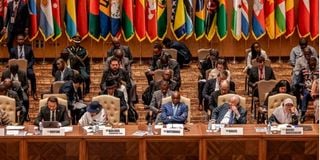
Delegates and Government representatives attend the opening session of the Third South Summit of the Group of 77 and China (G77+China) in Kampala on January 21, 2024.
Winding down 2024 and welcoming 2025 is a space-time moment to reflect on Africa and the world. In 2024, global tensions from previous years and decades continued unabated.
It is as if the change in time did not have a material impact on the geopolitics forged in geo-strategy. In 2025, expect a continuation of global competition on terms set along the West-East, Global North-Global South rifts.
Africa, a geopolitical battleground, will be pulled in either of these directions with immense political, cultural, and economic consequences. German political theorist Carl von Clausewitz (1780 – 1831) intoned that “war is the continuation of politics by other means”.
Last year politics and diplomacy tumbled and wars with great ramifications for Africa ratcheted. Two conflicts particularly shaped world politics. The Ukraine-Russia and Israel-Gaza wars have come to define global geopolitical postures, breaching the 2024-2025 interval.
The Russia-Ukraine war started on February 24, 2022, when Russia militarily struck Ukraine for the first time. The fact of Russia’s first military incursion explains why Western governments and intellectuals have framed the war as a “Russian invasion of Ukraine”.
The Russians contest this framing, contending that Ukraine’s bid to join the North Atlantic Treaty Organization (Nato) was the first act of provocation. They argue that Ukraine’s westward plans posed an existential risk to Russia’s security prompting the pre-emptive territorial annexation of eastern and southern Ukraine and the bombardment of much of the Ukrainian territory.
Of course, Ukraine, with Western armament, has responded in kind, defending territory and unleashing occasional sorties into Russia. The split in interests and intentions between Russia and the West over Ukraine spilled into Africa soon after the commencement of the war. Africa was sucked further into the ideological-military battle at the beginning of 2024.
The economic difficulties experienced in Africa in 2024 were partly due to dwindling or ceased supplies of necessities such as grains, particularly wheat, and agricultural inputs such as fertiliser from Ukraine and Russia due to the war. Western divesture from Russian gas and oil as part of wider sanctions suddenly made Africa a lucrative source for energy-reliant Europe.
Perhaps more importantly, Russia and Ukraine ramped up diplomatic and military entreaties towards Africa to sway opinion, garner support in the UN system, and diversify their trade relations due to the sanctions imposed on them in various parts of the world.
In August 2024, then-Ukrainian foreign minister Dmytro Kuleba visited Malawi, Zambia, and Mauritius. In October, the new foreign minister, Andrii Sybiha, visited Egypt, Angola, and South Africa. The surface-level significance of this Ukrainian shuttle diplomacy in Africa is three-fold. First, these were the first visits by top Ukrainian foreign policy honchos to Africa.
Second, Ukraine was borrowing from the Russian playbook. Veteran foreign minister Sergey Lavrov has frequented Africa on a charm offensive since the commencement of the war. In 2024, Lavrov maintained the African mission with visits to Guinea, Chad, the Republic of Congo, and Burkina Faso. Third, the Ukrainian charm offensive towards Africa can be read as an extension of Western entreaty towards Africa.
The more military-focused Russian diplomatic strategy in Africa is its paramilitary troops’ presence in the so-called coup belt of West and Central Africa. Initially, Russian boots on the ground in Africa mingled with a propaganda war against the West was led by the mercenary group Wagner.
After a fallout between Wagner and the Kremlin in 2023, Russia rebranded the group as Africa Corps in early 2024 witnessing a more direct involvement of the Russian defence ministry in places such as Mali, Burkina Faso, Chad, and Sudan. In all these, it is clear that Russia has targeted Western influence in Africa as part of a broader geopolitical war in which the war in Ukraine is but a piece of the action. It is unlikely that the Russia-Ukraine war will end in 2025.
Africa’s anti-Israeli posture
Even more complex is the geopolitics in the Middle East variously referred to as the “Israel-Gaza war”, the Israel-Palestine War”, and “the Israel-Gaza war”, among other partisan framings. It is worthwhile to comprehend that this theatre of war is proximate to the northern and northeastern reaches of the continent, across the Red Sea. African nations have largely thrown their lot with Palestine to the detriment of recent Israeli rapprochement on the continent. Why so?
First, the war taps into deep-seated religious sensibilities, pitting the Jewish-Judaic-Christian Israel against the Arabic-Islamic Palestine. Backing these two historical rivals are, respectively, the West, particularly the US, and the Muslim-majority countries, nineteen of them located in Africa.
This, in addition to the horrific death toll and destruction of Palestine, informs the African Union’s condemnation of Israel during the African Union’s Heads of State summit in February 2024. In other words, the official African Union position on the conflict is solidarity with Palestine and denunciation of Israel.
The second geopolitical ramification devolves from the first one. Africa’s anti-Israeli posture runs counter to the US military, diplomatic, and moral support for Israel. The most significant exemplification lies in South Africa’s cases against Israel at the International Court of Justice which commenced in February 2024.
The charge of alleged Israeli genocide in Gaza, backed by South Africa’s pursuit of respect for human rights as per international law has resonated on the continent. This development angered Washington so much that its Congress commenced an ominous legislation to “review” relations with Pretoria.
In the United Nations, African countries have either voted for ceasefire resolutions or abstained while the US has vetoed any attempts at condemning Israel. There are many layers to the African dimensions of the Israeli-Palestine conflict. Suffice it to say that in 2024 the needle shifted towards an anti-Israeli and by extension anti-West African impulse.
The commencement of the second Donald Trump presidency on January 20, 2025, will likely embolden Israeli attacks on Palestine. Infused in and encompassing the two great wars of our time – Ukraine-Russia and Israel-Palestine – are the ongoing attempts at geopolitical re-alignments and attempts at great power retention. Several developments in 2024 show Africa’s geopolitical pivots along the Global South – Global North divides.
Two developments kicked off the geopolitical year. First, Yoweri Museveni’s Uganda hosted the Group of 77 and China (G77 + China) and Non-Aligned Movement summits in Kampala in late January. There was little room for the involvement of either the West or Russia in these back-to-back summits thanks to their configuration as developing nation organizational events. Instead, China and India led the way in the co-option of Africa into what has gained traction as a Global South formation.
The ideological raison d’être is to contest the continued dominance of the Global North in world affairs. The convening of these summits in Kampala thus served as a platform for voicing the need for global reforms to reflect the so-called place of the global majority – developing and poor countries which are the sites of the world’s largest demographics.
Second and perhaps even more consequential are the dynamics around the BRICS (Brazil, Russia, India, China, South Africa). On January 1, 2024, the group expanded to include two African countries, Egypt and Ethiopia, along with Iran, Saudi Arabia, and the United Arab Emirates (UAE).
This was after a resolution proposed by South Africa’s President Cyril Ramaphosa during the BRICS summit in Johannesburg in August 2023. During the October 2024 BRICS Summit in Russia, three African countries joined the BRICS as partner states rather than full-fledged members, Algeria, Nigeria, and Uganda.
There is much nuance to the BRICS expansion. A top-level analysis however suggests that the increasing co-option of African countries is beginning to tilt the scales away from the West in a shifting global order. Key among the issues that have alarmed the West is talk about de-dollarization, that is, the use of currencies other than the US dollar for intra-BRICS trade.
It can be expected that the tectonic geopolitical shifts in which Africa is vested will continue in 2025. Of particular interest is South Africa’s presidency of the G20 throughout 2025 culminating in the first G20 summit in the last quarter of the year.
Dr Wekesa is Director, African Centre for the Study of the US, University of Witwatersrand and visiting professor at the universities of Southern California and Howard University: [email protected]









